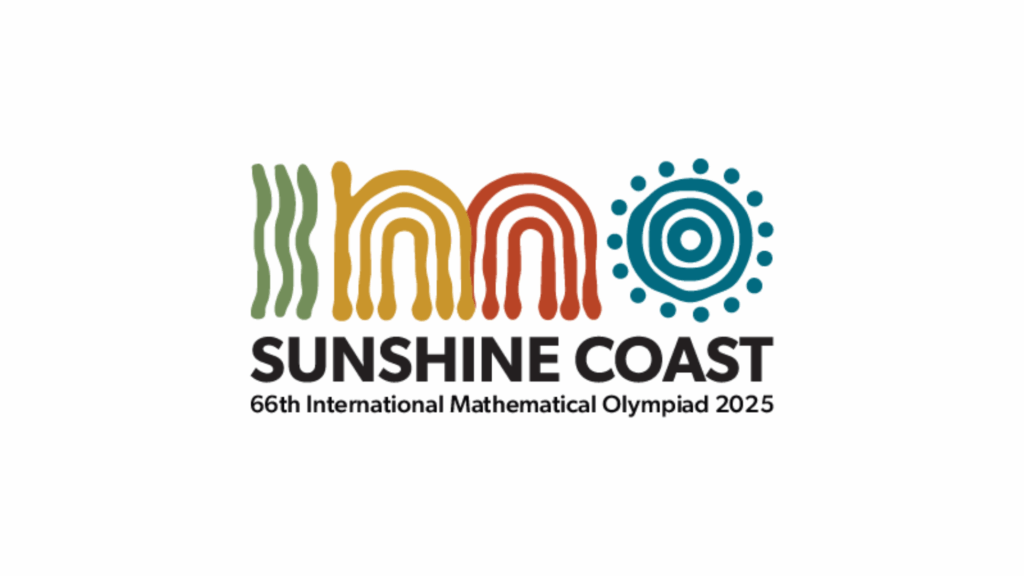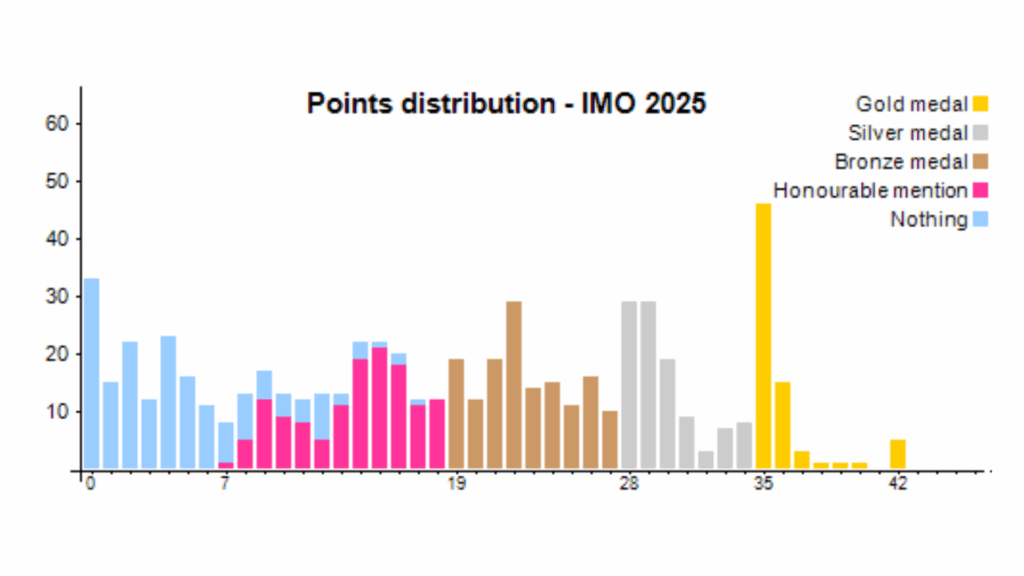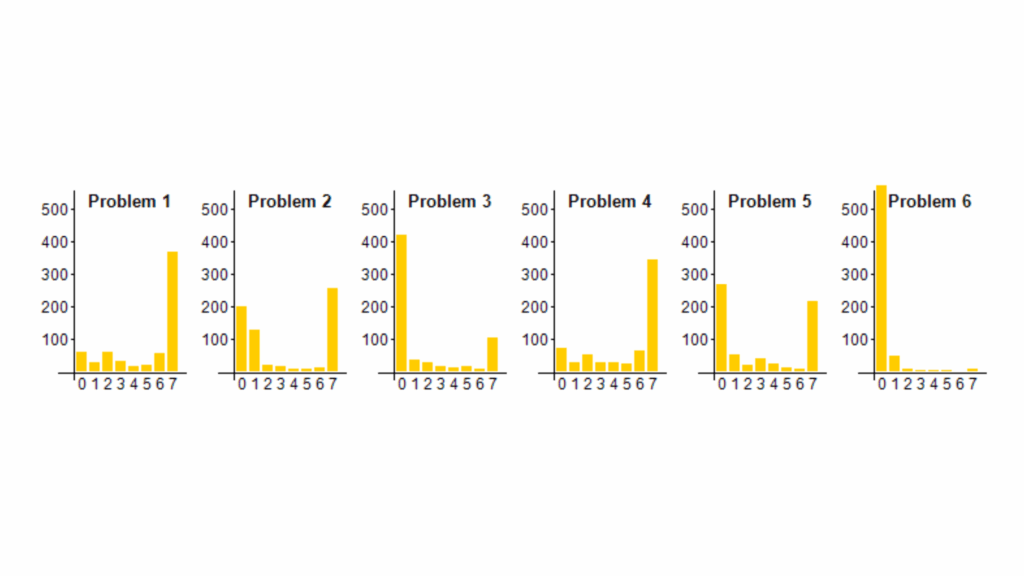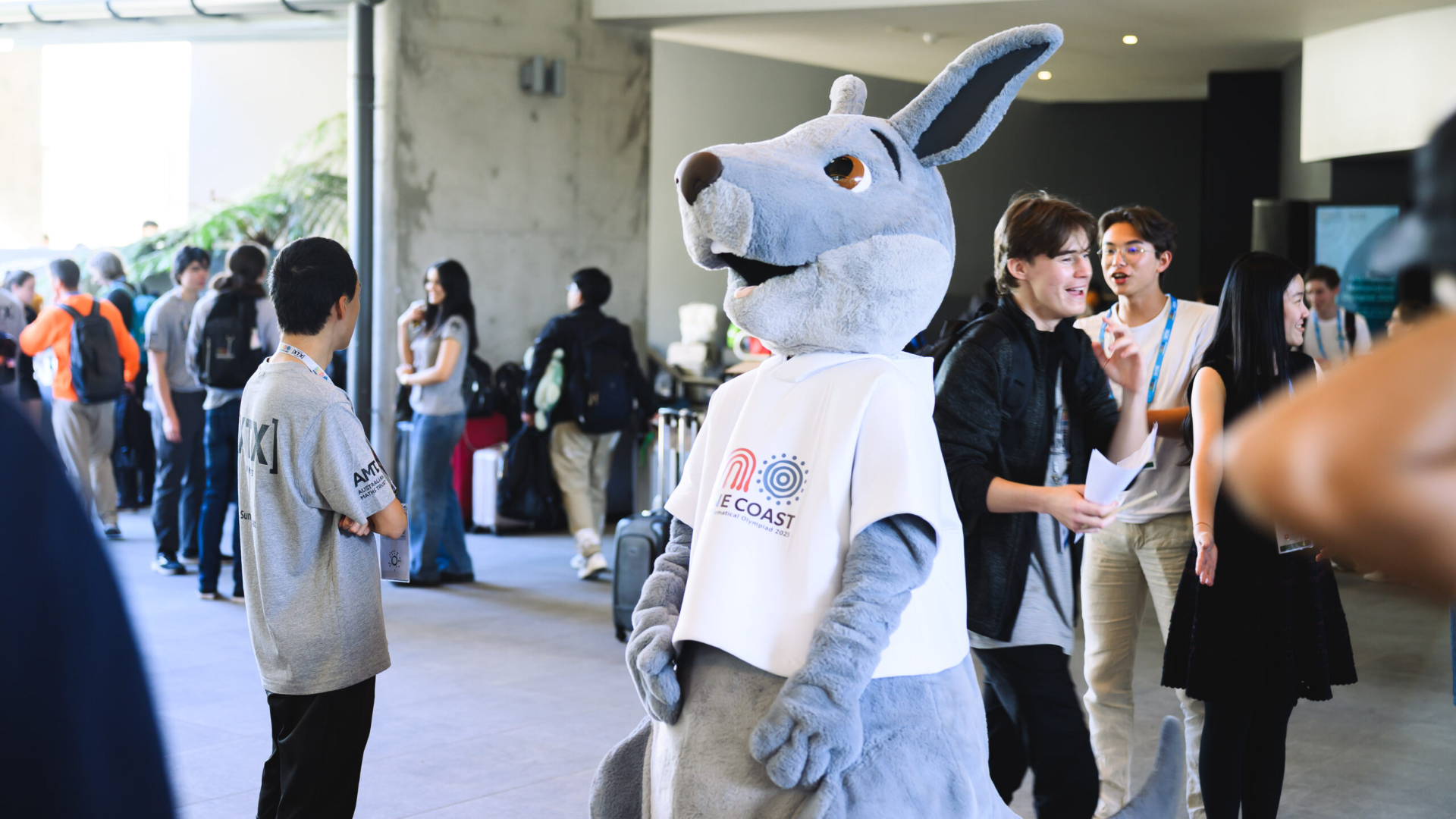The People’s Republic of China topped the medal table at the 66th International Mathematical Olympiad held in Sunshine Coast, Australia, winning the competition for the 25th time in 2025, 15 points ahead of the USA.
The International Mathematical Olympiad is a world championship maths competition for high school students, the most prestigious maths competition in the world. But for one year, it has been held annually across the world since 1959.
This year, it was the turn of the Sunshine Coast in Queensland, Australia, to host the IMO, with a record-breaking 110 countries taking part. The mathletes’ stay in the idyllic seaside town included koala encounters, beach walks and puzzle nights, offering a break from the fierce yet friendly mathematical competition.

Top 10 countries
| # | Country | Team size M / F | Pts | G | S | B | HM |
|---|---|---|---|---|---|---|---|
| 1 | 🇨🇳 People’s Republic of China | 6 / 0 | 231 | 6 | 0 | 0 | 0 |
| 2 | 🇺🇸 United States of America | 5 / 1 | 216 | 5 | 1 | 0 | 0 |
| 3 | 🇰🇷 Republic of Korea | 5 / 1 | 203 | 4 | 2 | 0 | 0 |
| 4 | 🇯🇵 Japan | 6 / 0 | 196 | 3 | 2 | 1 | 0 |
| 4 | 🇵🇱 Poland | 5 / 1 | 196 | 3 | 3 | 0 | 0 |
| 6 | 🇮🇱 Israel | 6 / 0 | 194 | 4 | 1 | 1 | 0 |
| 7 | 🇮🇳 India | 6 / 0 | 193 | 3 | 2 | 1 | 0 |
| 8 | 🇸🇬 Singapore | 6 / 0 | 191 | 3 | 2 | 1 | 0 |
| 9 | 🇻🇳 Vietnam | 5 / 1 | 188 | 2 | 3 | 1 | 0 |
| 10 | 🇹🇷 Türkiye | 6 / 0 | 186 | 2 | 3 | 1 | 0 |
Following the United States winning in Bath last year, the IMO’s most successful country China returned to their dominance of the competition, its team taking a clean sweep of gold medals with two of their mathletes even achieving perfect scores. The USA continues to be a formidable IMO nation, taking its tenth top-two placing in the last 11 years with five gold medals and one silver medal. Meanwhile, South Korea maintained its reputation for consistency with four golds and two silvers, an outstanding achievement for a country with a significantly smaller population than others at the top of the rankings.
There was a wave of delight and pride across social media as India achieved its best-ever score of 193 points, coming seventh in the table. The country’s rapid IMO rise has seen it score nine gold medals in the last three years. Vietnam affirmed its reputation as an up-and-coming IMO country, securing 188 points with standout performances in geometry and combinatorics.
Outside the top 10, hosts Australia had a record-breaking year, leaping up to 15th from 38th in 2024 with a highest-ever haul of 179 points. Despite winning the traditional pre-IMO ‘Ashes’ tournament with Australia by a solitary point, it was a mixed bag for the United Kingdom, placing directly behind the hosts with 178 points. The British team led by veteran Alex Chui scored three golds, one silver and two bronzes.
Elsewhere, Malaysia’s team included two 14-year-old silver medallists, including Yi Shuen Yeoh, one of the youngest female medalists ever.
Top 10 individuals
| # | Contestant | Country | Pts |
|---|---|---|---|
| 1 | Ivan Chasovskikh | 🏳️ Neutral | 42 |
| 1 | Warren Bei | 🇨🇦 Canada | 42 |
| 1 | Satoshi Kano | 🇯🇵 Japan | 42 |
| 1 | Leyan Deng | 🇨🇳 People’s Republic of China | 42 |
| 1 | Hengye Zhang | 🇨🇳 People’s Republic of China | 42 |
| 6 | Hongyi Tan | 🇨🇳 People’s Republic of China | 40 |
| 7 | Qiao Zhang | 🇺🇸 United States of America | 39 |
| 8 | Trong Khai Vo | 🇻🇳 Vietnam | 38 |
| 9 | Kanav Talwar | 🇮🇳 India | 37 |
| 9 | Kyungjun Park | 🇰🇷 Republic of Korea | 37 |
Incredibly, five students netted a perfect score across the six questions, the largest number to achieve this feat since 2001.
“I didn’t come to represent a flag. I came to prove that ideas transcend borders.”
– Ivan Chasovskikh, Russian mathlete competing as a Neutral
“I just wanted to write something beautiful. The score was a bonus.”
– Warren Bei, Canadian competitor who scored his fifth consecutive IMO gold with a perfect score
Trong Khai Vo’s journey from rural Vietnam to the Olympiad stage captured hearts across the country, demonstrating the increasing competitiveness of stars from southeast Asia.
Jessica Wan of the USA was the highest scoring woman at the IMO for the second year in a row. “I didn’t come to prove anything. I came to enjoy the challenge”, she said. “Problem 5 was my favourite — it felt like dancing with logic!”
Arlan Sayat was one of the mathletes who scored the central Asian country of Kyrgyzstan’s first ever medals at the Olympiad at only 13 years old. “I didn’t think I’d win. I just wanted to try”, reflected this year’s youngest ever medallist. “My sister helped me learn algebra. She’s my hero.”
Fan-favourite British mathlete Alex Chui, known for blending abstract sketches with problem-solving, scored his third gold medal in a row at the Olympiad, his sixth overall, affirming his status as one of the most decorated IMO participants ever.

The questions

The 2025 IMO problems were submitted by the USA, Vietnam, Colombia, Lithuania, Italy, and Singapore.
You can download the 2025 problems below:
Internet explanations and solutions
Problem 1 – Sunny Lines (Combinatorics)
“It felt like playing hide-and-seek with geometry. Every sunny line was a clue.”
– Jessica Wan, United States of America
Problem 2 – Tangents and Orthocentres (Geometry)
“I drew the diagram five times. The sixth one whispered the solution.”
– Satoshi Kano, Japan
Problem 3 – Bonza Functions (Number Theory / Functional Equation)
“I stared at the word ‘bonza’ for ten minutes before realising it was a trap. The function was the real beast.”
– Trong Khai Vo, Vietnam
Problem 4 – Divisor Sequences (Number Theory)
“It was deceptively simple. Like a riddle from a wise old aunt.”
– Ivan Chasovskikh, Neutral
Problem 5 – Inekoalaty Game (Algebra / Strategy)
“I played it out like chess. Every move had a shadow.”
– Kyungjun Park, Republic of Korea
Problem 6 – Grid Tiling (Combinatorics / Construction)
“It was like building a city with invisible rules. I loved the constraint.”
– Leyan Deng, People’s Republic of China
AI at the Olympiad
For the first time in IMO history, artificial intelligence was formally evaluated alongside human contestants and the results were startling. Both Google DeepMind’s Gemini and OpenAI’s unnamed LLM submitted full solutions to the six official problems, graded independently by former IMO medalists. Each model scored 35/42, matching the gold medal threshold and outperforming over 90% of human participants.
The announcement sparked controversy though as OpenAI released its results before the official closing ceremony, prompting criticism from IMO organisers and rival labs. Google responded with a pointed statement: “We respect the IMO’s timeline. The spotlight belongs to the students.” The incident reignited debates about AI’s role in education, competition, and intellectual recognition.
Technically, the models demonstrated impressive capabilities, solving geometry problems with synthetic diagrams, navigating combinatorics with symbolic reasoning, and even mimicking human-style proofs. Yet neither model was eligible for ranking, and both were excluded from the official scoreboard.
IMO Chair Dr. Maria Kovács addressed the issue diplomatically during the closing ceremony: “We thank all contributors — human and artificial — but today, the spotlight belongs to our students.”
AI is now capable of solving Olympiad-level problems, not just numerically, but with structured, readable proofs. Whether this marks the beginning of collaborative learning or competitive displacement remains to be seen.
You can watch the closing ceremony from Sunshine Coast here.
The spirit of the competition is summed up perfectly by one of the Colombian students: “I didn’t win a medal, but I won a hundred friends. That’s more than I expected.”
Next year, the IMO will be headed to Shanghai, China. Congratulations to all of the mathletes, team leaders, officials, organisers who made this event possible. Roll on Shanghai 2026!
“May your proofs be elegant, your errors instructive, and your curiosity unbounded.”
– Final line of the closing ceremony
